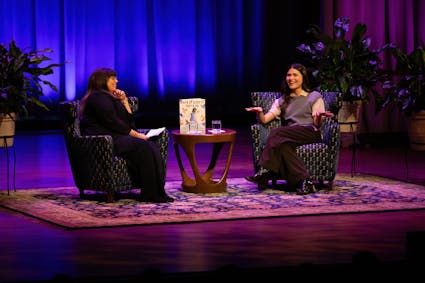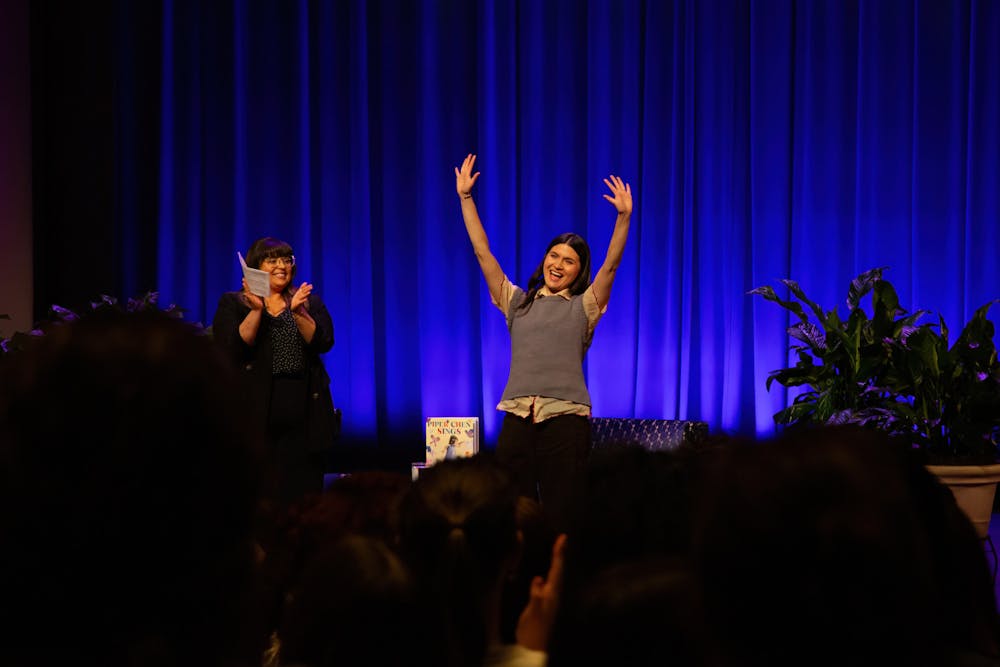Grammy winning and Tony and Emmy nominated actress Philipa Soo joined the Modlin Center for the Arts on Nov. 6 for an evening of conversation on storytelling, cultural connection and the transformative power of the arts.
Soo is best known for originating the role of Eliza Schuyler Hamilton in Broadway’s “Hamilton,” but she has also been in productions from the protagonist in “Amélie,” to Guenvere in “Camelot” to Cinderella in “Into the Woods”. Soo joined Ashley White, visiting assistant professor in the Department of Theatre and Dance and senior Gareth Woo, to discuss her career journey and the role of performance in shaping community and identity.
Soo spoke about her journey to Broadway and the uncertainties of early adulthood to overcoming stage fright, promoting diversity in the arts, and, above all, the importance of storytelling.
“I love having conversations with young people. I think young people are powerful, I think they are the future,” Soo said, explaining why she came to the University of Richmond, “and in the moments where I have any free time I possibly can, I am super inspired by going and talking with them and getting to know who they are and sharing a little bit of myself.
Much of Soo’s discussion was targeted towards young adults navigating the world post grad.
“Energy begets energy,” she said, recalling a lesson about pursuing opportunities from one of her teachers. “What you put into something is what you’ll get out of it.”
Soo explained that the value of an experience isn’t always in the outcome, but in what you put into it. “See as much as possible,” she said. “Read, go to plays, go to museums, listen to concerts, because it will inform how you want to live your life.”
She also encouraged students to face failures and embrace their mistakes. “Be curious about your failures,” Soo said, adding that discomfort and setbacks often “teach you in a cellular way…how you want things to be.”
White asked Soo about her first experience with storytelling. Soo said that it started with reading books in her parent’s lap, which inspired her to write the children’s book, “Piper Chen Sings,” about a young Asian-American girl who overcomes stage fright — like she did.
“It's a story about a little girl who overcomes something that's really difficult for her.” Soo said. “She learns how to navigate tricky emotions. It's a multicultural story, it's a story that teaches language – it's a story that uplifts the arts.”
Later in the conversation, Soo reflected on the broader power and responsibility of storytelling, sharing something her husband once told her: “History is told by its leader, its warriors and its storytellers. And when the leaders are corrupt and the warriors are following them, you’re left with the storytellers.”
Soo said this is a responsibility she does not take lightly, acknowledging that stories can “change the way that people think” and even “change the way that people breathe in a room together.”
Enjoy what you're reading?
Signup for our newsletter

Soo’s work in “Hamilton” was a pivotal part of the conversation. She reflected on her early experience with the production, recalling the moment she realized it was becoming a cultural phenomenon.
Soo said she knew the production was special from the minute she heard creator Lin-Manuel Miranda play it for her. But the importance of the musical really hit her when former First-Lady Michelle Obama attended the production.
“But when it really hit me was when I was backstage and I noticed there was [Michelle Obama] there – she came up to us and said it was her favorite piece of art she’d ever seen,” Soo said, “And I thought, ‘this is a big deal.’”
White and Soo discussed the cultural footprint “Hamilton” made in the theater landscape, particularly in expanding diversity on stage and behind the scenes.
It was partially through “Hamilton,” Soo said, that she learned what meaningful representation requires: “I learned that it’s not a box, it’s not boxes that you can check. It’s actually a conversation, which means it’s not finite.”
Soo was asked questions about visibility, navigating an industry that hasn’t offered visibility for Asian-American women.
Soo described the experience as “wonderful”, clarifying that that didn’t mean that it wasn’t difficult, but that the journey taught her about who she was.
“I learned so much about myself and my appreciation for who I am and where I come from and my heritage and my ancestry,” Soo said. “It all leads back to storytelling. This love of storytelling and understanding people for the things that you see in common with them, [with] the things that you don’t…and how to be curious about that within yourself, and within other people.”
In an interview with The Collegian after the discussion, Soo was asked why sharing art remains important when the arts are being underfunded and undervalued.
“It's powerful.” Soo said. “So the more that we can just remember that it has importance, and meaning, not just for the people who create it, but for the audiences that see it. It can really change things. It can move mountains.”
Sophomore Eliza Varanelli described the discussion as "otherworldly".
“I think seeing her and seeing how passionate she was about what she does was just, it was a feeling that I can't describe.” Varanelli said.
Varanelli is a part of UR players, the theater group on campus and was most recently in the Modlin Center’s production of “Silent Sky.” .
“I have been debating whether or not I should audition for the upcoming musical,” Varanelli said.
For Varanelli, Soo’s discussion clarified this struggle. She said that hearing Soo encourage the audience to approach life with fun and excitement inspired her to continue working in the arts.
“She said, just keep playing. And I don't know, that really stuck with me,” Varanelli said, “that's what I want to do, and I definitely am going to continue with theater.”
Contact lifestyle editor Sophie Dulog at sophie.dulog@richmond.edu
Support independent student media
You can make a tax-deductible donation by clicking the button below, which takes you to our secure PayPal account. The page is set up to receive contributions in whatever amount you designate. We look forward to using the money we raise to further our mission of providing honest and accurate information to students, faculty, staff, alumni and others in the general public.
Donate Now



